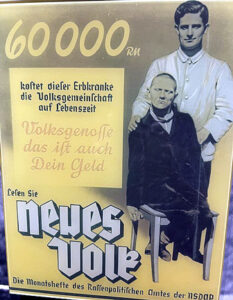Everything Snakelike In Humanity

Yesterday was spent at the Holocaust Museum in Skokie, illinois. The New York Times in a 2021 article lists 21 such museums in the United States. In my better judgment there will never be enough of such places. I am still reeling, trying to grasp the meaning of the images and the artifacts that I saw throughout the day yesterday.
The Jewish communities of Europe, initially German citizens living happily, contributing as citizens do to the well being of their fellows, were singled out, demonized, characterized as undesirable vermin, by the policy makers of the Third Reich. They were banished, rounded up for extermination, and then the scapegoating rapidly spread like a plague into all of the countries that came under assault by the German military. Death camps, industrialized murder followed. Reason finds the statistics, the numbers of murdered in each of the countries impossible to categorize.
Many escaped though, due to foresight, immigrating to the relatively few countries willing to welcome them. And some, in the crucible of impending doom, delegated their children to Kindertransport which rescued thousands of children to receiving families mainly in Great Britain. Many parents would never see their beloved children again.
I recognize it is natural to feel pity when anyone suffers, and self-pity for my own suffering. According to Nietzsche’s lights empathy, fellow-feeling is not a productive response. Nor ought we to be satisfied to conclude that the cruel scapegoating of Jewish friends, neighbors was merely due to the injustices, the restrictions imposed upon Germany by the victors of WWI.
The proclivity to inflict cruelty is inscribed within every human spirit. The evil lies latent.
On the other hand, according to Nietzsche, suffering may catalyze heights of humanity, kindness, self-sacrifice, and creativity – if we so choose.
Finally, I think the five paragraph sections that begin this passage would be an accurate description of a well-educated, privileged, middle-class American, someone like me.
In a word (but a bad one): they belong to
the levelers, these misnamed “free spirits”
– as eloquent and prolifically scribbling
slaves of the democratic taste and its “modern ideas.”
They are all people without solitude,
without their own solitude,
clumsy, solid folks
whose courage and honest decency
cannot be denied
– it’s just that they are un-free
and ridiculously superficial,
particularly given their basic tendency to think
that all human misery and wrongdoing
is caused by traditional social structures:
which lands truth happily on its head!
What they want to strive for with all their might
is the universal, green pasture happiness of the herd,
with security, safety, contentment,
and an easier life for all.
Their two most well-sung songs and doctrines
are called:
“equal rights”
and “sympathy for all that suffers”
– and they view suffering itself
as something that needs to be abolished.
We, who are quite the reverse,
have kept an eye and a conscience open
to the question of where and how the plant “man”
has grown the strongest,
and we think that this has always happened
under conditions that are quite the reverse.
We think that the danger of the human condition
has first had to grow to terrible heights,
its power to invent and dissimulate (its “spirit” –)
has had to develop
under prolonged pressure and compulsion
into something refined and daring, its life-will
has had to be intensified
to an unconditional power-will.
We think that harshness, violence, slavery,
danger in the streets and in the heart,
concealment, Stoicism,
the art of experiment, and devilry of every sort;
that everything evil, terrible, tyrannical,
predatory, and snakelike in humanity
serves just as well as its opposite
to enhance the species
“humanity.”
Beyond Good and Evil, by Friedrich Nietzsche, trans. Judith Norman, aphorism 44